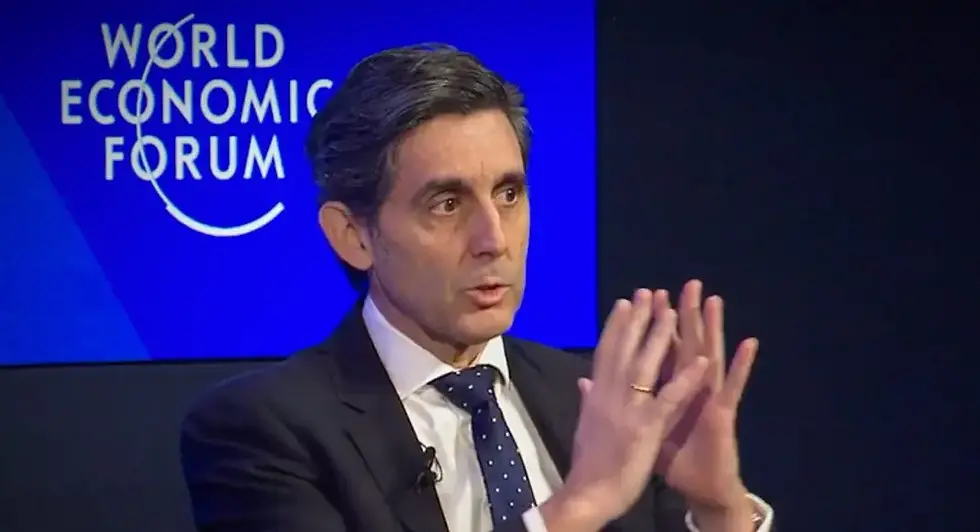
The 53rd Davos annual meeting brought together many world leaders to discuss trade, tech and tackling the climate crisis among some of the topics.
I was happy to hear the need for more collaboration continues to be something everyone can agree on. As World Economic Forum President Børge Brende said in his closing remarks:
"In an uncertain and challenging time, one thing is clear. We can shape a more resilient, sustainable and equitable future, but the only way to do so is together."
As I often say, together we are stronger.
During a panel session, José María Álvarez-Pallete, chairman and chief executive at Telefónica, responded to a question about the value of public-private partnerships (PPPs) for the future of work , to train and retrain workers in the digital age, Álvarez-Pallete said that the big question for society is how to manage its digital transition.
“Technology is the root cause of the problem, but also the root cause of the solution,” he said. PPP collaboration is “essential”, he said multiple times.
Below is Álvarez-Pallete’s response, in full, to the initial question about the future of work at the WEF panel.
“Technology is impacting everything. We are very focused on the pandemic, or the war in Ukraine, or inflation. But the reality is there is massive transformational change. Forty percent of the traffic that flows through our network today is not human anymore; those are machines talking to each other. During the pandemic, video conferencing from Friday to Monday was multiplied by a factor of seven. Things that were supposed to happen five years from now happened in the middle of the pandemic. Every week of the pandemic was equivalent to a year of digital adoption.
So technology is changing everything. It is already here, and we are going to have as much technology as we want.
But technology is creating inequality. The major challenge we face as a society, in my opinion, is inequality, Because this wave of technology is going to destroy millions of jobs. It is going to create millions of jobs as well. But if we don’t handle that transition in the right manner, we will face social unrest – which is the most dangerous thing a society can have. Not just in developing countries but everywhere.
So we need to make sure that whoever has a job can keep a job, and whoever doesn’t can find one. And we need to manage this transition. The traditional education system is not going to be able to cope because it is based on techniques that are not going to cope with the pressure the system is going to have. We need new ways-of-doing. In the case of Telefonica, we used to be part of a traditional telecoms sector. When you deploy fiber and 5G, you are no longer running a traditional telecoms network. You are running a massively decentralized supercomputer. The skills needed to do one thing are different to the skills needed to do another thing.
So what we have is the largest reskilling programme in Europe. We are reskilling, as we speak, more than 16,000 people, using technology. What we are proposing is to apply these new technologies to cope with the big problem, the societal problem.There are 10 million people unemployed in Europe and five million jobs that are vacant because people don’t have the skills. In the next five years in Europe, 20 million jobs will be created in digital transition, and also in artificial intelligence and the climate transition.
For me, technology is the root cause of the problem, but also the root cause of the solution. We have a programme called Reskilling for Europe, which we are running with the Association of Business Leaders (in Education; ABLE). We aim to create one million jobs in the next two years, and five million in the next six years. So it can be done. But this is not because of the pandemic. This is not because of the war in Ukraine. This is not because of inflation. It is because of the massive impact of technological change that is going to be here for good.
And technology itself doesn’t have values. The result depends on how we use technology, and which values we want that technology to be frameworked in. I think inequality is the problem, and the one we should tackle. And reskilling and technology are part of the solution.”
It was powerful to hear Álvarez-Pallete be direct. I agree when he said that technology is changing everything. It is already here, and we are going to have as much technology as we want.
To watch the full recording of this panel click here
Did you enjoy Davos this year? What were your takeaways?
Let's continue collaborating together and taking action.
Elise Quevedo
コメント